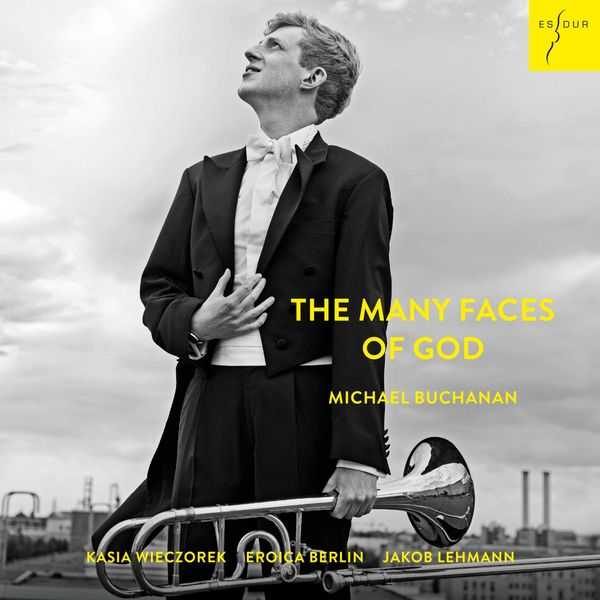

Composer: Johann Sebastian Bach, Ludwig van Beethoven, Max Bruch, Arvo Pärt, Stjepan Sulek, Toru Takemitsu, Iannis Xenakis
Performer: Michael Buchanan, Jamie Williams, Andre Melo, Jurgen Oswald, Kasia Wieczorek, Emily Hoile, Delia Stevens
Orchestra: Eroica Berlin
Conductor: Jakob Lehmann
Format: FLAC (tracks)
Label: Es-Dur
Catalogue: ES2077
Release: 2019
Size: 531 MB
Recovery: +3%
Scan: cover
Beethoven: 3 Equali, WoO 30
01. No. 1, Andante
02. No. 2, Poco adagio
03. No. 3, Poco sostenuto
04. Bach: Cello Suite No. 2 in D Minor, BWV 1008 (Arr. For trombone)
05. Bruch: Kol nidrei, Op. 47 (Arr. For trombone and piano)
06. Xenakis: Keren per trombone solo
07. Sulek: Trombone Sonata, “Vox Gabrieli”
08. anon.: Qawwali sufi
09. Pärt: Spiegel im Spiegel (Arr. For trombone and piano)
10. Takemitsu: Fantasma / Cantos II
The British trombonist and inaugural winner of the 2015 ARD Music Competition, Michael Buchanan, releases his first album, The Many Faces of God, on the Hamburg label ES-DUR.
On his debut release, Michael Buchanan dedicates himself to the various facets of the divine. The key element of his spiritual journey is the trombone, with its broad spectrum of tonal expression. “Despite all our differences, we all look upwards into the same sky” notes Buchanan, focusing on the commonalities between the world’s heterogeneous faiths.
The sound of the trombone in the tradition of Western “classical” art music is associated, possibly more than for any other instrument, with the divine, the beyond and the “otherworldly”. This is proven not only by the Three Equali for Four Trombones, WoO 30 – which Ludwig van Beethoven composed at the request of the Linz Cathedral capellmeister Glöggl as funeral music for All Souls’ Day. In Gluck’s “Orpheus and Eurydice”, the trombones brilliantly represent the underworld to which Orpheus travels; in Mozart’s “Don Giovanni”, the instrument is used suddenly, in the final minutes of the opera, to accompany Don Giovanni’s descent into hell. Many other examples can also be found in compositions by Wagner, Mahler, Brahms and Schumann.
This tonal content of his instrument is reflected by Michael Buchanan both in original compositions – such as Keren for Solo Trombone by Iannis Xenakis, the Sonata “Vox Gabrieli” for Trombone and Piano by Stjepan ulek: and the Cantos II and Fantasma for Trombone and Orchestra by the Japanese composer Toru Takemitsu but also in adaptations such as the composition Kol Nidrei, op. 47 by Max Bruch, which is based on two themes of Jewish origin, and the Qawwali Sufi Folk Song, which originates in the islamic Sufi mystic movement.
Michael Buchanan multi award-winning trombone player based in London. At the age of 22 he was awarded the first prize and audience prize at the 2015 Munich ARD International Music Competition. This launched a solo career that lead to accolades such as the 2017 BMW-Publikumspreis at the Festspiele Mecklenburg-Vorpommern in Northern Germany and an official “debut” concert – together with the Deutsches Symphonie – Orchester Berlin – in the Berlin Philharmonie.
Michael began his career as principal trombone in the Orchestra of Scottish Opera. In 2016 he joined the Vienna Philharmonic and Vienna State Opera Orchestras in a contract position for the 16-17 season. As a freelance principal trombone, Michael is frequently invited to perform with orchestras such as the Philharmonia Orchestra, the Academy of Saint Martin in the Fields, the London Sinfonietta and the Aurora Orchestra, as well as a personally selected member of Seiji Osawa’s Saito Kinen Festival Orchestra in Japan.



